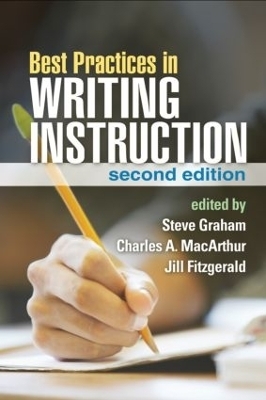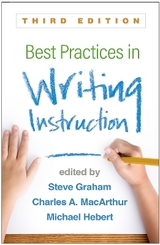
Best Practices in Writing Instruction, Second Edition
Guilford Press (Verlag)
978-1-4625-1008-5 (ISBN)
- Titel erscheint in neuer Auflage
- Artikel merken
New to This Edition
*Revised and expanded to address the CCSS.
*Incorporates the latest research and instructional procedures.
*Chapters on teaching argumentative and informative writing.
*Chapters on college and career readiness, writing to learn, writing about texts, and response to intervention.
See also the editors' Handbook of Writing Research, Second Edition, which provides a comprehensive overview of cutting-edge writing research that informs good practice.
Steve Graham, EdD, is the Warner Professor in the Division of Educational Leadership and Innovation at Mary Lou Fulton Teachers College, Arizona State University. He is also Research Professor in the Learning Science Institute at the Australian Catholic University in Brisbane. Dr. Graham is editor of the Journal of Educational Psychology. He has coedited several books, including Handbook of Writing Research, Second Edition; Handbook of Learning Disabilities, Second Edition; and Best Practices in Writing Instruction, Second Edition; and is the coauthor of three influential Carnegie Corporation reports: Writing Next, Writing to Read, and Informing Writing. Dr. Graham has received numerous awards, including the Career Research Award from the Council for Exceptional Children (CEC), the Kauffman–Hallahan Distinguished Researcher Award from the CEC Division of Research, the Samuel A. Kirk Award from the CEC Division of Learning Disabilities, the Distinguished Researcher Award from the special education interest group of the American Educational Research Association (AERA), and the Wiederholt Distinguished Lecturer Award from the Council of Learning Disabilities. He is a fellow of the AERA and the International Academy for Research in Learning Disabilities. Charles A. MacArthur, PhD, is Professor of Special Education and Literacy in the School of Education at the University of Delaware. His major research interests include writing development and instruction for struggling writers, development of self-regulated strategies, adult literacy, and applications of technology to support reading and writing. Currently he is coprincipal investigator of a research project evaluating a curriculum for college developmental writing courses based on self-regulated strategy instruction. He is coeditor of the Journal of Writing Research and serves on the editorial boards of several other journals. Dr. MacArthur has published over 100 articles and book chapters and coedited or coauthored several books, including Best Practices in Writing Instruction, Second Edition; Handbook of Writing Research, Second Edition; and Developing Strategic Writers through Genre Instruction. Jill Fitzgerald, PhD, is Research Professor and Professor Emerita at The University of North Carolina at Chapel Hill. A former primary-grades teacher and reading specialist, she conducts research on literacy issues for multilingual learners, understanding text complexity, and vocabulary measurement. Dr. Fitzgerald is a member of the Reading Hall of Fame, a Fellow of the American Educational Research Association (AERA), and a recipient of research awards from Phi Delta Kappa, the International Reading Association, and the AERA. With more than 100 publications, she is associate editor of the Journal of Educational Psychology and serves on the editorial boards of several other journals. She has also been a review panelist for the Office of Education, the Institute of Education, the National Institutes of Health, and the National Institute for Literacy.
I. Designing Writing Programs
1. Designing an Effective Writing Program, Steve Graham and Karen R. Harris
2. Writing Instruction in Preschool and Kindergarten, David L. Coker, Jr.
3. Best Practices in Teaching Writing for College and Career Readiness, Dolores Perin
II. Types and Purposes of Writing
4. A Developmental Approach to Teaching Narrative Composition, Anne McKeough
5. Best Practices in Teaching Argumentative Writing, Ralph P. Ferretti and William E. Lewis
6. Best Practices in Teaching Informative Writing from Sources, George E. Newell, Jennifer VanDerHeide, and Melissa Wilson
7. Best Practices in Writing to Learn, Perry D. Klein and Amy Meichi Yu
III. Strategies for Teaching and Learning in Writing
8. Best Practices in Teaching Planning for Writing, Cindy Lassonde and Janet C. Richards
9. Best Practices in Teaching Evaluation and Revision, Charles A. MacArthur
10. Best Practices in Sentence Construction Skills, Bruce Saddler
11. Best Practices in Spelling and Handwriting, Bob Schlagal
12. Best Practices in Promoting Motivation for Writing, Pietro Boscolo and Carmen Gelati
13. Best Practices in Using Technology to Support Writing, Rachel Karchmer-Klein
14. Best Practices in Writing about Text, Timothy Shanahan
15. Best Practices in Writing Assessment for Instruction, Robert C. Calfee and Roxanne Greitz Miller
IV. Special Populations
16. Best Practices in Teaching Writing to English Learners: Reducing Constraints to Facilitate Writing Development, Carol Booth Olson, Robin Scarcella, and Tina Matuchniak
17. Writing Instruction within a Response-to-Intervention Framework: Prospects and Challenges for Elementary and Secondary Classrooms, Gary A. Troia
| Verlagsort | New York |
|---|---|
| Sprache | englisch |
| Maße | 152 x 229 mm |
| Gewicht | 600 g |
| Themenwelt | Schulbuch / Wörterbuch |
| Geisteswissenschaften ► Sprach- / Literaturwissenschaft ► Literaturwissenschaft | |
| Geisteswissenschaften ► Sprach- / Literaturwissenschaft ► Sprachwissenschaft | |
| Sozialwissenschaften ► Pädagogik ► Schulpädagogik / Grundschule | |
| ISBN-10 | 1-4625-1008-6 / 1462510086 |
| ISBN-13 | 978-1-4625-1008-5 / 9781462510085 |
| Zustand | Neuware |
| Haben Sie eine Frage zum Produkt? |
aus dem Bereich



